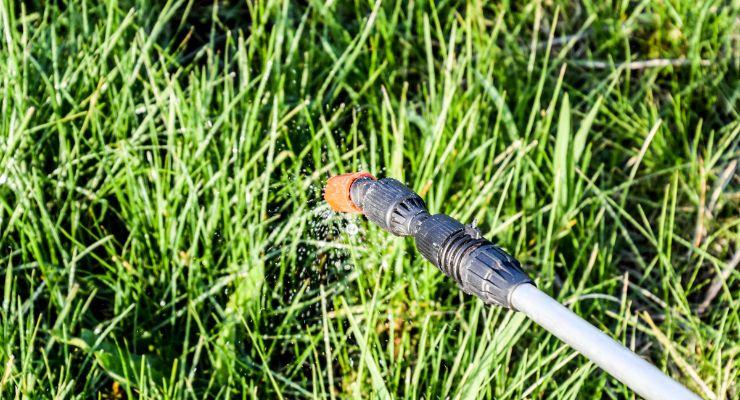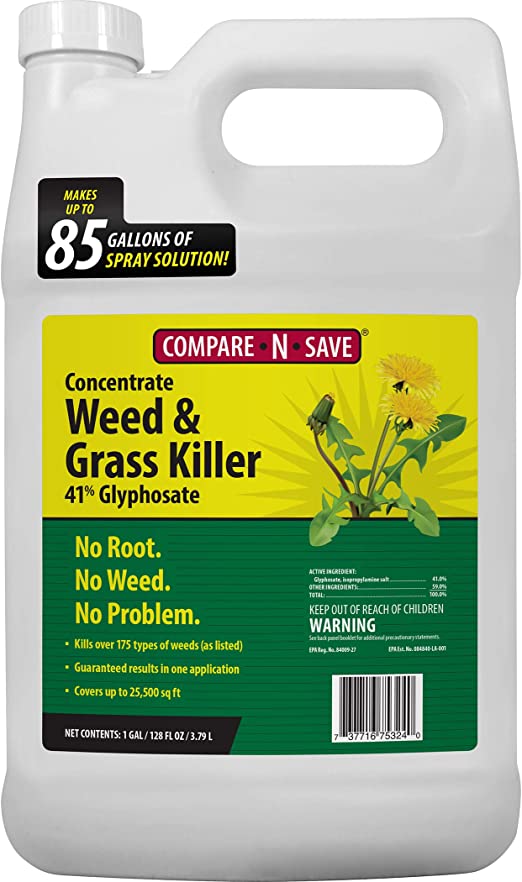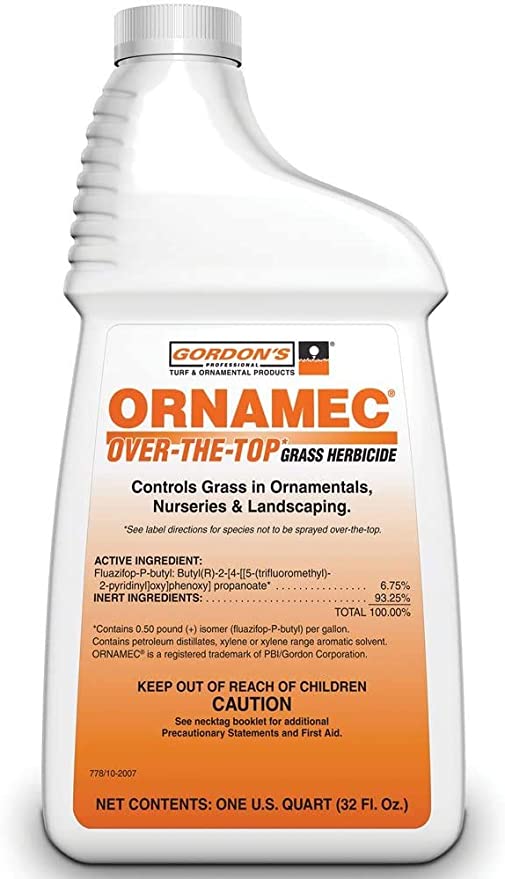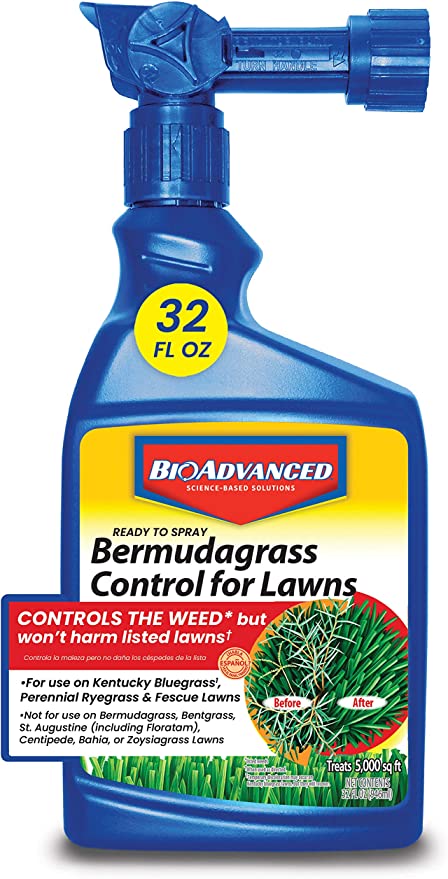Also known as Cynodon dactylon, Bermuda grass has its origins in Africa. According to the U.S. Department of Agriculture, the grass grows in hardiness zones 7 to 10 in the southern areas of the United States.
The invasive grass species is common in various parts of the world and is known as couch grass, devil’s grass, and dog’s tooth grass, among many other names.
What does Bermuda grass look like?
It makes beautiful, lush green lawns. However…
How to kill Bermuda grass where it’s not wanted as a weed or when you decide to replace it with something else that can be a tall order?
Bermuda grass is persistent, tough, and aggressive in growth. Its above-the-ground runners (stolons) and underground roots (rhizomes) spread fast to cover the ground, making it ideal for turf or grass lawns.
For the same reasons, its vigor and the extensive rooting system make it difficult to control Bermuda grass, and kill and completely eradicate it from where it has grown vigorously over time. It can also be a stubborn weed for other plants and grass species, more so tall fescue and zoysia grass.
Bermuda grass easily affects nearby areas such as flower beds. It can even sprout back to life after it’s been long dead.
Getting rid of the Bermuda grass roots of this aggressive warm-season turfgrass and fodder isn’t enough to solve the issue. Most homeowners and professionals deploy continuous application of herbicides such as Glyphosate to get rid of Bermuda grass.
According to a study on using herbicides to get rid of turf grass, it takes multiple herbicide applications over 30 days to kill 90% to 95% of this invasive weed.
Spraying a powerful herbicide with Glyphosate on it until it browns and starts to die is one way of eradicating the Bermuda grass rooting system that spreads fast.
However, if you’d rather not use harsh chemicals on your organic lawn, you can consider other techniques to kill Bermuda grass. They include:
- Solarization to burn out the grass
- Stripping the grass manually using your hands
- Adding a layer of mulch, cardboard, or landscaping fabric to choke out Bermuda grass
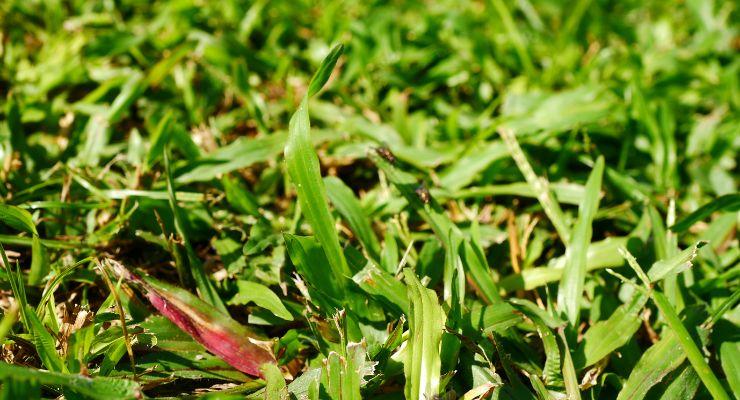
You can read more about these methods in the following sections.
Whether you want to kill Bermuda grass to create room for other plants or just want to replace it with a different lawn grass variety, like fescue grass, use any of the following effective techniques for killing a Bermuda grass lawn.
3 Best Ways to Kill Bermuda Grass
Herbicides
Method of Application
Backpacks and pump sprayers are popular for chemical weed killer applications aimed at removing Bermuda grass. A non-selective herbicide that’s glyphosate-based is used for the complete cleanup of a Bermuda grass lawn.
Non-Selective Herbicides (Glysophate-based)
What is a non-selective herbicide and how to use it?
Non-selective herbicides are harmful to all kinds of plants they make contact with, not just weeds such as Bermuda grass.
Glysophate is an active ingredient in herbicides such as Roundup used to kill weeds. It can kill Bermuda grass, ceasing its invasive growth and fast spread to cover the ground.
Most local home improvement centers and gardening stores sell the herbicide as a spray in a pump sprayer.
Use the weed killer with care because it’s toxic. Wear protective gear such as a respirator or face mask and gloves during application. Follow all instructions on the product label to ensure the application is correct and safe.
Water your Bermuda grass lawn thoroughly for 2 weeks before weed killer application to facilitate vegetative growth. This is important because the weed killer works on the leaves where it’s absorbed.

When is the best time for application?
Bermuda grass leaves soak up the most nutrients in spring and summer, making them the best time for weed killer applications to get rid of your lawn.
Evenly spray a coat of heavy mist of the non-selective herbicide onto the area you want to rid of the grass. Leaves absorb the chemical, which breaks down the enzymes the grass depends on to grow. Let the grass dry up for a series of days without irrigating or mowing the area.
Continue to treat the lawn as many times as possible up to 5 times because Bermuda grass is resilient and persistent. One application may not totally eradicate your Bermuda lawn. Wait for at least 2 months before planting anything in the soil because herbicides can affect the growth of future plants.
Compare-N-Save Concentrate Grass and Weed Killer
Compare-N-Save is a leading manufacturer of effective non-selective herbicides. The Compare-N-Save Concentrate Grass and Weed Killer contains 41% Glyphosate and comes with a 1-gallon capacity.
The weed killer becomes rainproof in 2 hours and delivers noticeable results in just two to four days. The non-selective weed killer covers up to 25,000 square feet.
The weed killer can prepare about 85 gallons of chemicals you can readily spray. It has a minimal residual effect.
Selective Herbicides
What is a selective herbicide and how to use it?
Unlike non-selective herbicides, selective herbicides get rid of specific plants they target to kill. For instance, a specific herbicide may get rid of Bermuda grass only upon landing on its leaves but may have no effect on other plants in the same area.
A selective weed killer is applied to specific plants it targets to get killed. However, a grass killer may leave out ornamental plants but works on getting rid of both weed and cultivated grass.
Although a selective herbicide works differently, it’s applied in the same manner as a non-selective weed control solution.
When is the best time for application?
The best time to apply selective herbicides is in spring and summer when plants attain vegetative growth fast. It’s important for the lawn to grow to a certain level before herbicides are applied to kill it.
Gordon’s Ornamec 170 Grass Herbicide
Gordon’s manufactures top-quality herbicides for weed control. The Gordon’s Ornamec 170 Grass Herbicide is available in 32-ounce capacity.
Selective herbicides help with landscape bed maintenance. It minimizes the risk of injuring ornamental plants because no tools are used during a grass control application.
Based on selective action, the chemical weed killer works against specific annual grasses. It controls goosegrass, panicums, foxtail, crabgrass, and sandbur.
The weed killer also helps control perennial species such as quack, Johnson, torpedo grass, and Bermuda grass. It controls the growth of targeted plants in 48 hours, killing them in 1 to 3 weeks.
The herbicides get rid of manual weeding, save on labor, come ready to use, and kill emerging weeds in your flower bed without injuring flower blooms.
The Ornamec Grass Herbicide covers up to 5,000 square feet.
BioAdvanced 704100B Bermudagrass Control for Lawns Weed killer Ready-to-Spray
BioAdvanced is a leading provider of science-based solutions to help care for flowers and edibles, trees and shrubs, and lawns. It also manufactures high-quality and effective grass control solutions, Bermuda grass killers, and insect killers.
The BioAdvanced Bermudagrass Control for Lawns acts selectively to eradicate Bermuda grass weeds growing where they’re not wanted. It does so without causing damage to your lawn.
The herbicides work against warm-season grasses to protect cool-season grasses such as Kentucky bluegrass, perennial ryegrass, and tall fescue lawns. Available in 32-ounce bottles, the chemical gets rid of the need to buy an expensive, time-intensive treatment for killing Bermuda grass.
The weed killer comes ready to spray to kill Bermudagrass without injuring your lawn, allowing it to flourish. It becomes rainproof in an hour and covers about 5,000 square feet.
However, the selective chemical isn’t effective against lawns of the following grasses:
- Saint Augustine grass and floratam
- Bent grass
- Zoysia grass
- Bahia grass
You may buy the weed killer in two, three, and four packs as you deem fit.

Solarization
Solarization involves using the sun for getting rid of Bermuda grass. It’s organic, less labor-intensive, and effective in killing and controlling Bermudagrass. The best time to apply this technique of killing grass is in the summer. It kills the entire grass, including rooting systems.
Mow or hand-strip your Bermudagrass lawn to make the grass short. Water your Bermuda grass lawn and spread a transparent clear plastic tarp over the whole lawn to cover it. Avoid creases and wrinkles on the tarp. Use bricks and rocks to weigh down the tarp’s edges.
Sun rays penetrate the tarp to bake the soil beneath to a higher temperature, effectively killing all the plants including Bermuda grass. Remove the clear plastic tarp after a month or 6 weeks and rake the dead plants to clear the area, or let them decompose to improve soil composition.
Weed Barrier (Fabric/Cardboard)
A weed barrier can smother the root system of Bermudagrass. When using cardboard, cut back the grass and remove the cuttings from the area. Dislodge and pull out underlying root systems.
Alternatively, mow the lawn to keep the Bermudagrass short. Cover it with 2 or 3 layers of cardboard to insulate the lawn from receiving moisture, direct sunlight, and nutrients. Overlap each one of the cardboard edges to prevent new buds from popping up in between them.
Place mulch on the cardboard and leave it untouched for 2 to 6 months. You may also use landscaping fabric or multiple wet newspapers instead of cardboard.
Mulch usually doesn’t work for killing one or more Bermuda weeds.
Removing Bermuda Grass in Flower/ Garden Beds
You can manually uproot Bermudagrass from your flower bed or garden bed. Deep culling eventually kills the grass or minimizes its presence. You can also use grass selective herbicides with great spot control, ensuring the weed killer doesn’t land on any one of your useful plants.
If you must use non-selective herbicides, use absolute spot control and make the application under non-windy conditions.
Killing Bermuda Lawn Grass in a Vegetable Garden
Herbicides are toxic, hence not ideal to kill Bermudagrass in a vegetable garden. Opt for an organic method such as solarization, using landscape fabric, or manually uprooting the weeds using your hands.
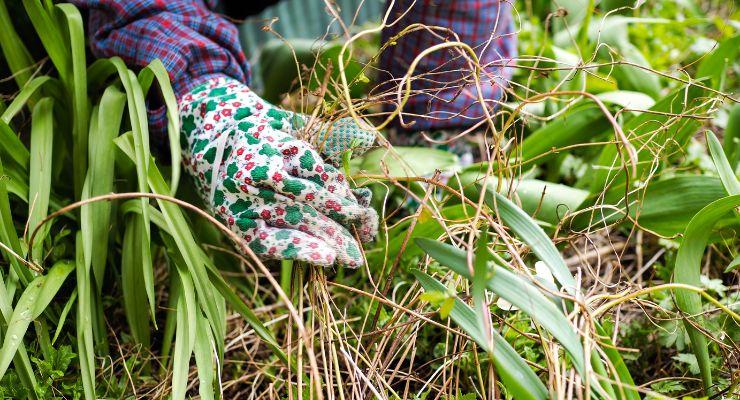
Conclusion
Bermuda grass makes great lawns. However, it can be a stubborn weed that’s difficult to eradicate due to its vigor, resilience, and aggressive growth.
Whether you want to get rid of Bermuda grass as a weed in your garden or kill an entire lawn, you can use various techniques to achieve desired results. They range from solarization to the use of herbicides to kill Bermuda grass.
